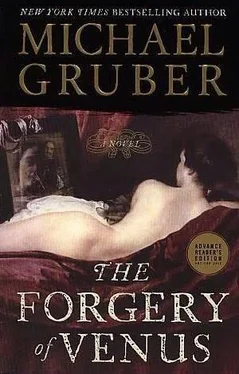I don’t know what to answer. I am dizzy. My knees shake. We fall upon the couch. She is upon me now, naked, her skin giving off a heat I can feel on my face, as from a brazier. She plucks at my clothes, her hands under my shirt, sliding down my body. I should try to break free, I know, but I have no strength in my hands or limbs.
“But let us suppose,” she continues, “that such an art exists, and that it is as far above the coupling of the mass of mankind as your art is above a painted sign hanging before an inn, or the music of the divine Palestrina above a street boy’s whistle. Do you think it possible? Let us now explore this interesting question.”
So was I taught about love, but I did not love the learning. Never before had I been imprisoned by my own flesh, and I found therein a harsh jailer, one who never slept, whose eye was always on me, whose hot goad was crueler than the instruments of the Holy Office, for they were used for the gaining of hell rather than heaven. What tricks she had of finger and mouth, and she gave me potions and salves so that I was as a boy of eighteen upon the couch-not that I ever did thus even as a boy of eighteen. She was like a cat in season, on me everywhere, in my studio, in my apartments, in hallways, in carriages, in the fields and amid the ruins of old Rome, in her house at Trastevere all night long. And still I had my duty to do, the buying, the shipping, the meetings with notables, my painting.
I painted her again, two more Venuses, as my lord of Heliche demanded, one standing in the pose of Medici’s Venus and another with Mars discovered by Vulcan. I aged ten years in that year.
In bed, in her passion, she called me Velázquez, and I told her no one calls me that and she must not either. She asked, then, “What do they call you in Spain?”
I answered, “They call me El Sevilliano, or Señor de Silva, or Don Diego.”
“Even your wife?”
“What my wife calls me is not for you to know,” I say, “but not Velázquez, at any rate. That is my name in painting.”
“I know,” she says, “and that is why I call you Velázquez in my bed, for were you not Velázquez you would not be there.” And starts her damned caresses again.
I think that she believed in nothing but painting, certainly not honor, nor station, nor the truths of our Holy Faith, or but a little. She treated me sometimes as a god for this reason, and other times as a slave. I was a slave with her, I admit, and a god too.
I will say she knew paintings. She would look at what I bought with a keen eye and inform me about what paintings were to come on the market, or which cardinal would part with some prize to curry favor with my king. I showed her once an Annibale Caracci I was thinking of buying, a Venus Adorned by Graces, and she laughed and said, “That is no Caracci. It is that wretched boy in Naples again, at his tricks. He is very good.”
“What boy?” I asked.
“Old Giordano’s son, Luca. The father is a nothing, a sign painter, but the boy is a prodigy, another Giotto perhaps, if he can stop his crimes to make a style for himself.”
“And why is this forger not brought to book?” I asked.
“Because he signs his work with his own name and paints it over. Look,” she says, and goes to my table and soaks a rag in turpentine. She rubs at a corner and there is a signature revealed. We both laugh at that. I think I have not laughed so much in my life as when I was with her. And we fought too.
Once she took me to Santa Maria in Trastevere to the porch of the basilica where the cripples gather, the deformed and the naturals, to seek alms, and she asked me if I wanted to paint these as I had painted the royal dwarfs and fools.
“Why should I?” I answered. “Those I painted because they were in the king’s service and part of his household. I painted his dogs too.”
This answer I saw did not please her, and she asked me, “Does the king love you?”
And I replied, “Assuredly he does, for he gives me honor and appoints me to noble posts in his house.”
She said, “Well might he honor you, for you do him honor with your brush and paint the magnificence of his daughters so they may be married off to kings and emperors. But does he love you as Velázquez, as I love you? Or are you a sport of nature, as are these miserable ones? The infantas of Spain have dwarfs around them so that their beauty is magnified by comparison, and so the king has the greatest painter in Europe by him, to magnify his own glory. It is all they care about, the kings of the earth.”
“The king loves me,” I said again. “He has said he will make me a knight of Santiago when I return.”
I had not meant to say this, for to boast to a woman of such things is not my way, but she vexed me, and I thought about how I had spoken with Rubens on the same subject and how he had slighted my king.
“Ribbons are cheap,” she said. “It is like giving a sweetmeat to a fool or a scrap to a dog.”
I grew angry then, for she was not Rubens, and I said, “You know nothing of such matters, you, the daughter of a merchant and a stranger to honor.”
“Am I so?” she said in a loud voice, so that the crowd turned and stared. “Do you think that? Yes, my mother married a merchant to keep from starving, but she descended from the Colonnas and before that from the Aurelii. We were great in Rome when Madrid was a mud village. And what of your blood, Sr. Sevilliano, you from a city swarming with half-Jews and quasi-Moors and every sort of mongrel cur!”
And she strode away back to her house and I was laughed at in the street.
We fought like that many times. She had no idea of how a woman should behave. Many times I stayed away and many times she did too, but always her witchcraft drew me back, this madness, destroying all honor and duty as an oiled rag wipes through the paint and makes all dull mud.
I painted her once more, toward the end of my stay in Rome. The king had commanded me back to Spain, each letter more importunate, and yet I could not leave. She was with child, she said, mine, and I believed her. Her husband barred her from his house and cut her off entirely, and she took a mean apartment near the river by the Pope’s bridge. I said I would acknowledge the child and see it bred, but this did not seem to please her as it should. She knew I was going; of course I was going! What did she imagine, that I would stay with her there or drag a concubine back to the Alcázar? She drank. She had always drunk deeply of wine, but now she began to take brandy and Holland spirits. It made her madder and even more abandoned in lust. And dragged me down with her.
So, upon an afternoon in spring, we had exhausted ourselves upon the couch in my studio, and as it happened that same mirror was propped up upon a high chest, and as we lay there our reflections shone out from the dusty glass and she said, “That would be a painting, Velázquez, a Venus as the world has not yet seen her, fucked into insensibility by her Adonis. But you would never do a thing like that. Your Holy Office and your Spanish court would never approve. Or no, I believe that such a painting is beyond even your art, to capture us as we are now and perhaps will never be again. No, not even you.”
“I can paint anything,” I said, “even this.”
“Then do it! There are the paints, here am I. You can paint our little kitchen-boy Cupid in later.”
I got up from the couch and placed a primed canvas on my easel and painted her as she was. I worked all afternoon, and when the figure was done I turned it to the wall and would not let her look, though she snarled at me like a vixen. Later I found the boy we’d used in the first painting, the one of her back, and painted him in, and then the rest, the draperies and so on, and when I was done I hid it in my closet where I keep my funds and my accounts and where no one goes but me.
Читать дальше












